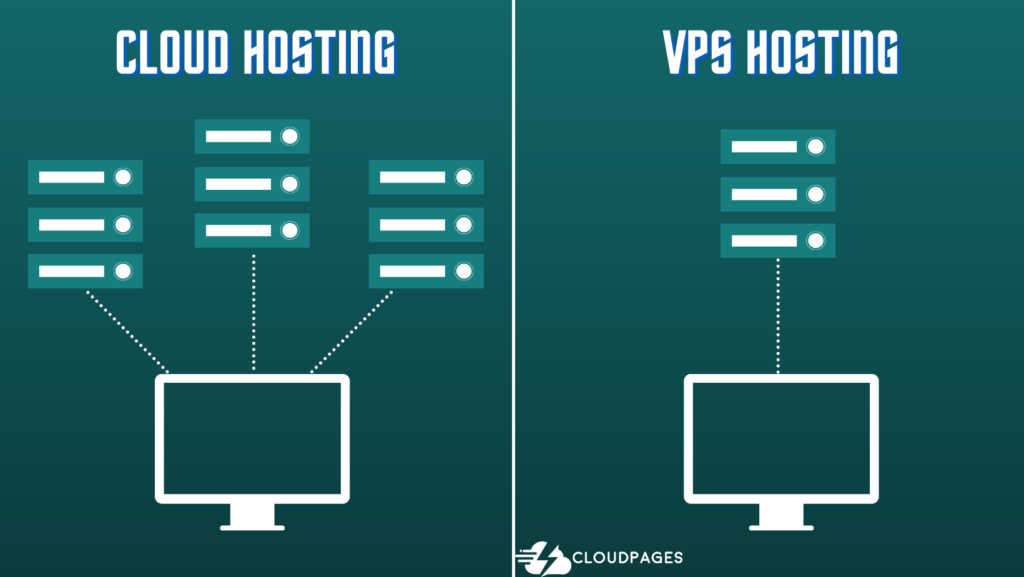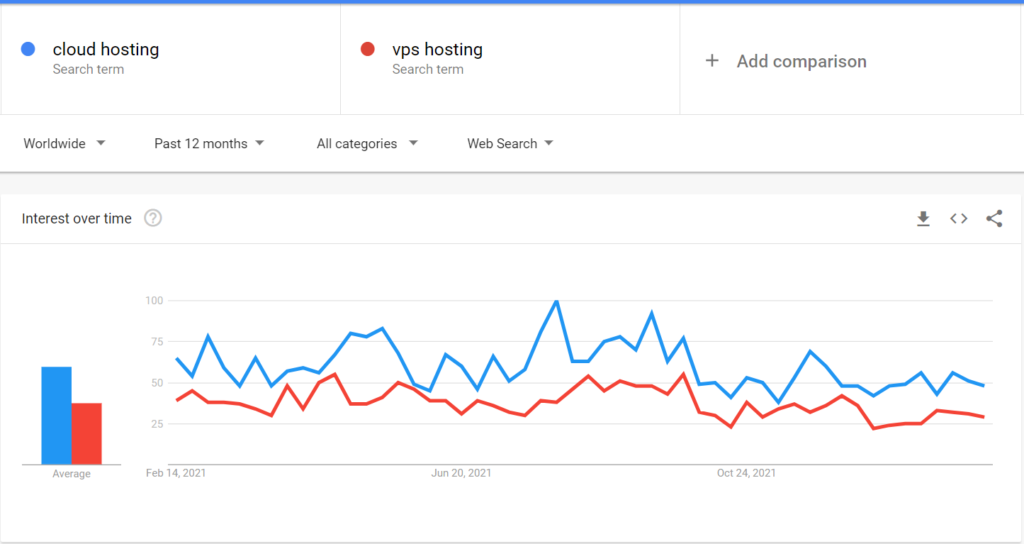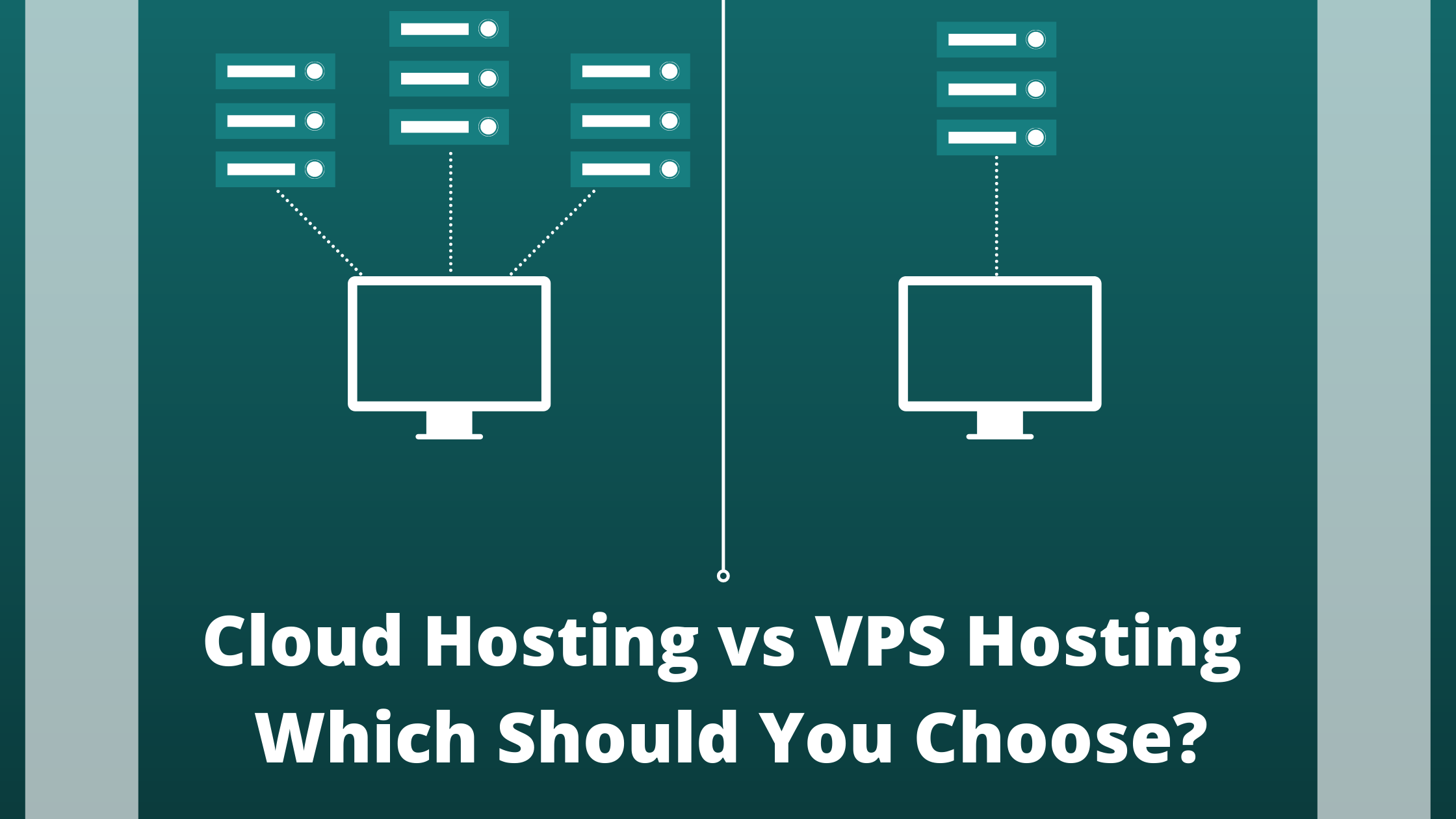If you’re looking for reliable hosting for your WordPress website, it’s crucial to know the difference between Cloud vs VPS hosting. This could save you money and headaches down the road, and help you decide which one is right for you.
These days the word Cloud is sometime used for marketing purpose as well, even though on the back end you are still getting a VPS or a Managed VPS.

Table of Contents
What is Server Virtualization?
Whenever we talk about Cloud vs VPS hosting, we have to discuss virtualization. In simple terms, server virtualization is the process of breaking a physical server into numerous smaller servers using virtualization software such as a hypervisor. These partitioned servers are virtual in nature, and each one functions as its own separate entity with its own set of resources. In fact, when you opt to host your website on a VPS server, you are just paying for a portion of the server, not the full server. As a result, virtualization saves hardware resources, lowers maintenance costs, and lowers the amount of electricity required to run the physical infrastructure.
Virtualization is used in both Cloud Hosting and VPS (Virtual Private Server) Hosting, where each server appears to be a single dedicated machine but is actually a virtual server. Despite the fact that they have one thing in common, there are several qualities that set them apart totally.
What is VPS hosting?
VPS hosting or virtual private server hosting is a hybrid of shared hosting and dedicated hosting. In other words, a VPS is a virtual private server. By dividing a real server into many virtual servers (VMs), a hypervisor (e.g. VMware ESXi, Red Hat KVM) creates and runs virtual machines.
As a web professional, you may have the best of both worlds with VPS Hosting. One huge system is partitioned into multiple virtual boxes in VPS Hosting. These virtual boxes then have their own resources such as RAM, CPU, operating system, and disc space.
Benefits of VPS hosting
- One of the advantages of VPS Hosting is that, similar to Dedicated Hosting, you have complete root access to your server. As a result, you can tailor your server environment to your specific requirements, such as installing any program.
- Your resources are not shared, and you receive the advantages and functionalities of a Dedicated Server with VPS Hosting. However, because you are sharing a physical server with other websites, the pricing is reasonable in comparison.
- Every VPS has its own Operating System (OS) and receives a predefined number of resources dedicated to that VPS alone. Virtual Servers in that machine operate independently, do not interfere with each other, and can be restarted separately.
Cons of VPS Hosting
- Virtual Private Server hosting is more expensive than shared hosting. VPS hosting on a managed server is usually more expensive than VPS hosting on an unmanaged server. While the cost is higher, you get more bang for your buck than with shared hosting. It is also less costly than dedicated server hosting.
- When comparing VPS hosting to dedicated hosting, there are several limitations. You’ll need to upgrade your VPS package or even switch to a dedicated server if you hit those limits. These restrictions are, however, more stringent than those imposed on shared hosting.
- Configuring a server necessitates a higher level of technical knowledge. VPS hosting is less demanding for users than dedicated hosting, but it still requires some technical knowledge to manage your server.
- You don’t have full control over your server. Users of VPS hosting do not have complete control over their environment, as they do with dedicated hosting.
- Your resources aren’t being used effectively. This is because your web host’s space may have been oversold. It’s possible that it’ll produce server problems that affect all other sites on that host. As a result, you should be aware of how many virtual accounts are currently hosted on your server.
When to consider VPS hosting
A VPS is usually a suitable choice if you wish to host one or more sites, each of which requires several pages and plugins. This is also a fantastic fit if you expect on receiving thousands of visitors every month. It’s also big enough for WordPress Multisite to run smoothly, you can easily deploy a WordPress site on CloudPages using a VPS. For example
- A new business that requires a complex website but does not anticipate to develop quickly.
- If you want to show off your photography or start a blog and plan to post a lot of images on a regular basis, this is the place to be.
- A website that requires specific scripts and plugins to function.
Why choose VPS hosting
- You’re seeking for a server environment that can be customized.
- You’d like your own server but don’t have a large company.
- You want a Dedicated Hosting environment that is also cost-effective.
What is Cloud hosting?
Cloud hosting is essentially a collection of several servers linked together by a shared network to form a single huge server. Unlike traditional hosting, Cloud Hosting distributes resources such as RAM, CPU, and disc space among machines. As a result, there is no delay in CPU power delivery or RAM availability.
Cloud hosting encompasses not just the powering of websites and web apps, but also storage, the requirement for high-end security, root access, and other factors.
Benefits of Cloud hosting
- Better performance – Because the demand is evenly spread among the servers connected to the network, it improves the performance of websites and web applications. Because it is not dependent on a single physical server like Shared Hosting, resource availability is also high.
- Increased scalability – Cloud hosting provides for easy and instantaneous CPU and RAM upgrades, enhancing scalability as your website’s traffic grows.
- Secure data – Data mirroring is a feature of cloud hosting that helps you keep your data safe. The data is replicated on three different devices on various drives, ensuring that you will not lose your data in the event of a hardware failure. This makes data backup and recovery a breeze.
- Cost saving – Although Cloud Hosting may appear to be expensive at first glance, when you examine the capabilities it offers, the price becomes far more affordable. You may also only have to pay for the resources you utilize in some circumstances. Free data migration, fully managed hosting, resource monitoring, and other capabilities are available through Cloud Hosting.
- Good stability – Data has triple redundancy as a result of mirroring, therefore cloud hosting is dependable. This ensures that your data in the cloud is secure, as well as making data recovery easier in the event that the server fails.
- Increased speed – Cloud Hosting servers have a low density, which aids in the speed and varnish of your website. Varnish is a web emulator that lets websites to handle tremendous traffic while still loading pages quickly by caching static and dynamic content on the page. It has the ability to speed up websites by about 1000 percent.
Cons of Cloud hosting
- Out of your control – You entrust the security of your data to a third party.
- Provider dependent – Every service provider has a unique package with unique features. If you have a technical problem, you must contact your provider’s customer service rather than trying to fix it yourself. Not all service providers offer customer care 24 hours a day, seven days a week, 365 days a year.
- Internet access dependent – You are now, to a lesser extent, reliant on internet access to access your data.
When to consider Cloud hosting
Cloud hosting could be quite beneficial to larger WordPress sites or networks, especially if they have a lot of material and traffic.
Cloud hosting is used by large enterprises and institutions such as Netflix, Airbnb, and NASDAQ. If your website is as large as any of these, cloud hosting should be one of your top choices.
Even small organizations and individuals may find reasonable and trustworthy cloud hosting services thanks to the various managed cloud hosting providers available. You’d typically get the same benefits, but it’d be less expensive because you’d only pay for what you use.
Why choose Cloud hosting
- You’re a flourishing company with a significant increase in traffic.
- You’ll need a lot of bandwidth and a lot of technological knowledge.
- You want to be able to scale your website as needed with only a few clicks.

Difference between Cloud vs VPS hosting
Lets list out some major differences in a tabular form between cloud vs vps hosting.
| Feature List | VPS Hosting | Cloud Hosting |
| Server Deployment and management |  |  |
| Server Sharing Model | Private Server | Dedicated Cloud Server |
| Scalability (auto/manual) |  |  |
| PaaS offering |  |  |
| Containerization |  |  |
| DBaaS |  |  |
| Low Cost |  |  |
| Pay As You Go |  |  |
| Customization |  |  |
| Security |  |  |
| Instant Provisioning |  |  (in managed hosting) (in managed hosting) |
| Performance | Depends on the vendor | Fast |
| Reliability |  |  |
| Multiple Data Centers | Depends on the vendor |  |
Google trends: Cloud vs VPS hosting

When we compared Cloud vs VPS hosting, we can clearly see that during the past 12 months, cloud hosting is a huge trend as compared to VPS hosting. Even on the worse dips, VPS hosting is no where as popular as Cloud hosting.
Which to choose? Cloud vs VPS hosting?
VPS is ideal for small projects that do not require a complicated infrastructure solution. Organizing a remote office for a company with 10-20 people is a classic example. As long as the workloads are generally stable and the setup allows enough flexibility for the project, a virtual server will easily handle it. This is a good solution for smaller businesses that need resources comparable to a dedicated server but don’t want to spend too much money on IT.
The cloud is ideal for large projects with complicated network infrastructures and high security and mobility requirements. The flexibility to adjust the configuration on the go will help the client in adapting to the expansion of their business. Businesses that deal with seasonal traffic will also benefit from this. Users of the cloud can turn off resources they aren’t utilizing right now and pay less when they don’t need them.
What problems does the cloud solve?
The public cloud is a collection of software and technology that is made available to users via the internet. Servers, storage, network infrastructure, apps, and services are all part of this complex, which is portrayed as a single pool. On-demand, the pool’s resources are dynamically divided among users.
Users can set their own configurations, establish bespoke virtual networks using the control panel, and install OS systems and programmes utilising the IaaS (Infrastructure-as-a-Service) concept. Virtual network devices in the cloud can be set up and linked in the same way that real network devices can.
One of the key benefits of IaaS is its flexibility. Without having to contact the supplier, public clouds can be scaled instantaneously to meet the needs of the user. Adding and withdrawing resources is done via the control panel, regardless of the time of day or the user’s location. Clients with high demands for scale, reliability, and performance will be interested in this functionality.
In the cloud, microservices are frequently employed. These services are used to secure data, monitor systems, and perform other activities. As an example, here’s a couple of microservices available in the public SIM-Cloud:
- VPN as a service, VPNaaS: helps users set up virtual private networks quickly
- Firewall as a service, FWaaS: filters internet traffic based on the chosen security policies
- DNS as a service, DNSaaS: helps users automatically control domain configurations, as well as create, edit and delete DNS records
- Notification as a service: sends automatic notifications about important events in the project
Clients are typically allowed to install their own microservices in addition to those provided by default. On-demand XaaS services are also available from some providers. Backup-as-a-Service, or BaaS, is the most popular example of such a service. Users are not need to set up their own reserve copying systems; simply select your desired options and backups will be produced automatically.
Because of the cluster architecture, cloud hosting is fault resilient. The availability of cloud services is not dependent on any particular physical equipment, such as a disc array, a server, or a network. If a piece of hardware fails, the workloads are automatically moved to another device. The client’s services will not be harmed as a result of this.
Separate cloud availability zones are also available from some providers. An availability zone is a cloud environment that is self-contained and runs on its own hardware. When services are deployed in two availability zones, they are twice as fault-tolerant.
It’s vital to keep in mind that public clouds should not be used to work with sensitive data like banking or medical records. Because data in the cloud is stored alongside that of other users, this limitation applies. In industries that operate with sensitive data, private clouds are employed; in other circumstances, public clouds are used for less sensitive data.
What are the benefits of Cloud hosting for VPS providers?
VPS hosting has served many people well – for a very long time when comparing Cloud hosting vs VPS hosting. Cloud computing, however, can eliminate a number of management overheads. With a VPS hosting account, each client gets a certain amount of computing power. If demand increases and the system cannot handle the increased flow, the system will crash. In the same way, if a system fails, it cannot provide services. Maintaining the customer’s servers and minimizing downtimes without impacting their services is an operational overhead.
With cloud hosting, you can develop your infrastructure in a new way to accommodate the growing demand for resources. In a cloud environment, the website is hosted on a pool of unified computer resources. If a server reaches its maximum capacity, a backup server is ready to take over.
As a result, if a server fails, no harm will be done to any subscriber services, because other servers will continue to serve incoming traffic. By switching to a full-featured cloud service, you can provide stability and extensive functionality to your clients. Customers are given an endless supply of resources to use, which they can configure themselves and release whenever they are done. Due to the pooling of resources from several physical servers, you can efficiently meet the demands of businesses.
Conclusion
Cloud computing and virtual private servers are not mutually exclusive. Your VPS can be hosted in a virtualized environment. This enables you to split a real server into several virtual machines, each of which operates as a separate physical device for operating IT resources and web applications in a flexible, cost-effective, and scalable manner.
When we see Cloud vs VPS hosting, we can see that a cloud server is a more scalable, redundant, and personalized version of a virtual private server (VPS) without the restrictions.



